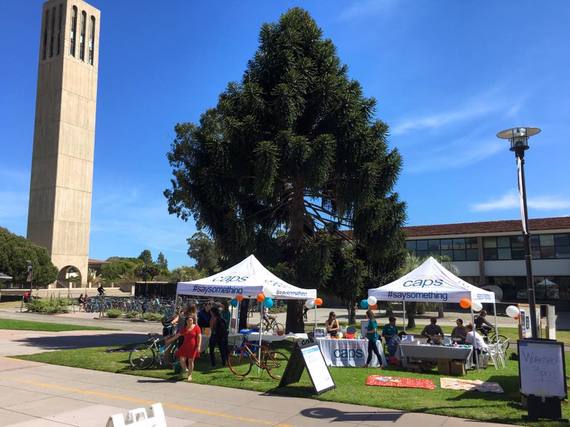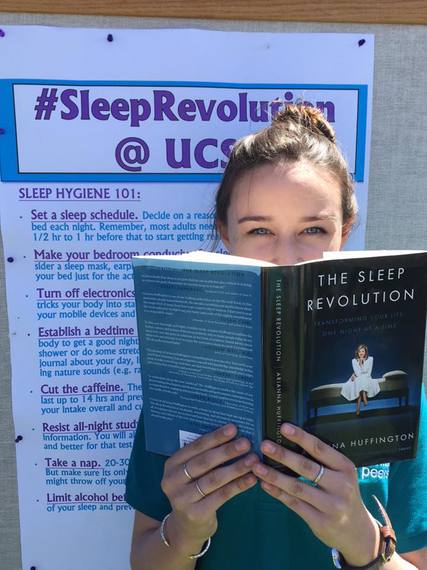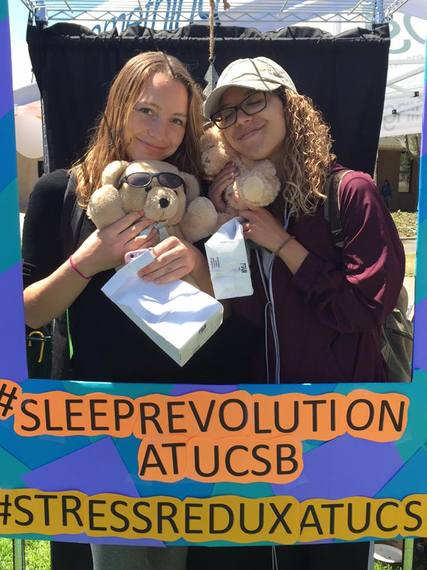Being a student at UC Santa Barbara can be quite a balancing act. On any given day you can be taking a stroll down to the beach, feverishly applying for summer internships, texting your mom so that she knows you are still alive, cramming before a major exam, or happily noshing on Freebirds nachos after a party. While the daily activities may vary, a universal theme for UCSB students is that we are stressed. And when academic, social, and professional stressors converge, the first thing that we often sacrifice is precisely what could help us manage our stress - sleep!
The paradox of sacrificing sleep is that as we become more stressed, lack of sleep only exacerbates our stress and grogginess which, in turn, decreases the quality of our sleep. It's a vicious cycle. Our culture as a whole does not place enough of an emphasis on caring for ourselves and being well-rested. This is doubly true among young college-aged students. Although UCSB has a reputation as a hard-partying school, it is also a highly-ranked research institution that holds students to rigorous academic standards. The result is an environment where pulling all-nighters, having multiple extracurricular or work commitments, and partying into the wee hours of the morning are seen as badges of honor, but end up stretching us thin.
"The paradox of sacrificing sleep is that as we become more stressed, lack of sleep only exacerbates our stress and grogginess which, in turn, decreases the quality of our sleep."
Recent surveys show that this work-hard, play-hard environment has tangible effects upon UCSB students. Results of the National College Health Assessment indicated that 45% of UCSB students felt tired during most of the week (3-5 days) with significant portions of the student body reporting feeling poorly rested in the morning. Further, fitness tracking technology company Jawbone released a study showing that UCSB Gauchos get just under 7 hours of sleep during the week and scarcely more than that on weekends, which is below the National Sleep Foundation's recommended 7-9 hours of sleep for 18-25 year olds and places us amongst the most sleep-deprived universities nationwide. Remember too that students in the survey are Jawbone users--folks that are typically more health conscious to begin with--so this average could possibly be inflated in comparison to the overall UCSB student population. It is clear that UC Santa Barbara is in need of a #SleepRevolution.
The Huffington Post's Sleep Revolution College Tour kicked off this spring, bringing the gospel of healthy sleep practices to college campuses. Our Counseling and Psychological Services (CAPS), where I work as a Mental Health peer, had slated two big stress reduction events during midterm season, with sleep hygiene as a core feature of self-care, and our Health & Wellness center was launching a 7-day sleep challenge for students called UCanSleepBetter. So it was only natural to team up with HuffPost to bring the #SleepRevolution to UC Santa Barbara during the last weeks of April and early May.
At our CAPS events, the Mental Health peers and clinical staff provided practical information through billboards, workshops, and sleep kits (with over 500 distributed within the 2 days!) and students took a break to enjoy each other's company in fun and creative activities (e.g., building mindfulness jars and stress balls; coloring; and playing in drum circles!). Dr. La Guardia, our CAPS psychologist who spearheaded our events, summed up for us why an emphasis on good sleep is such an important part of stress reduction as well as building vitality for personal well-being. "When stress is coupled with not getting enough sleep and eating poorly, more significant psychological issues are more likely to emerge." She also noted that rather than just focusing on treating students when problems are already amplified, the goal of CAPS programming is to help students to prevent the physical and psychological costs of stress by getting more sleep and eating regularly, develop coping tools to reduce their daily stress, and build more vitality and resilience by connecting to important others and doing activities that are fun and personally meaningful.
Taking care of both mind and body in order to experience life more fully may sound easier said than done but it is surprisingly effective when we make time for ourselves. Whether you are binging on Netflix or stressing about your approaching finals, a little sleep goes a long way.
Chidi Agu is a Mental Health Peer for the University of California Santa Barbara Counseling & Psychological Services (CAPS) department.


